- Knowledge Base Development - 1: Creating Ontologies and Knowledge Bases
- Knowledge Base Development - 2: Filling Ontologies and Knowledge Bases
- Knowledge Base Development - 3: Type of Outgoing Concepts' Set
- Knowledge Base Development - 4: Specifier Types
- Knowledge Base Development - 5: Constraint Types
- Knowledge Base Development - 6: Creating References and Clones
Typea of Sets of Outgoing Concepts
Each concept of ontology can be nested with a set of concepts of a lower level of the hierarchy, called outgoing ones. Depending on the type of set of outgoing concepts, when creating a knowledge base, the platform provides various options for generating concepts of the knowledge base.
To express the concept of ontology through the notion of a lower level, there are two types of relations (specifying the options for generating concepts of the knowledge base when creating it):
- List (set) - the concept is given by a list (a set of more specific concepts); when creating a knowledge base on the basis of each more specific concept of ontology, an appropriate element of the knowledge base can be generated.

- Alternative - the concept is defined as one of more specific concepts; when creating a knowledge base for a concept, only one relevant element of the knowledge base can be generated.

Examples of concept generation:
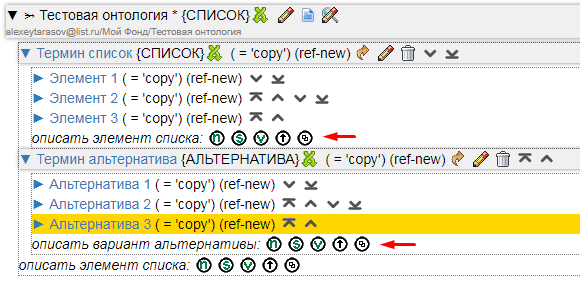
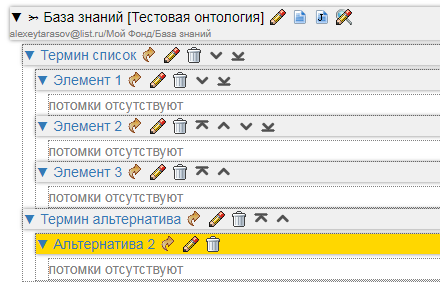
As you can see from the example for the "List" type set, all possible elements were generated, whereas for the "Alternative" type set only one of the variants was generated.
Note: the platform allows you to change the type of set of outgoing concepts, even if the notions of the knowledge base have already been generated based on the notion of ontology.
Arranging outgoing concepts
Concepts can be ordered using the up, down, up, and down buttons.


Types of outgoing concepts
In ontology, both nonterminals and terminals (Terminal-grade, Terminal-value) can be used as lower-level concepts, depending on the type of ontology concept, different types of knowledge base concepts are generated.
Nonterminal
A concept that can contain other outgoing concepts, i.e. will be expressed through the concepts of a lower level.
Creation of a concept of the type "Nonterminal" in ontology
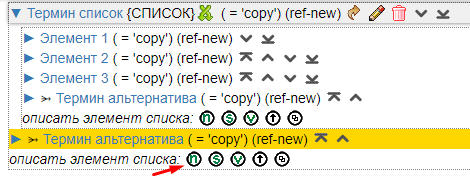
When creating a concept of this type, you must specify its unique name, as well as qualifiers and delimiters of incoming relations (described below). If necessary, you can also provide comments for the term itself and the inbound relationship.
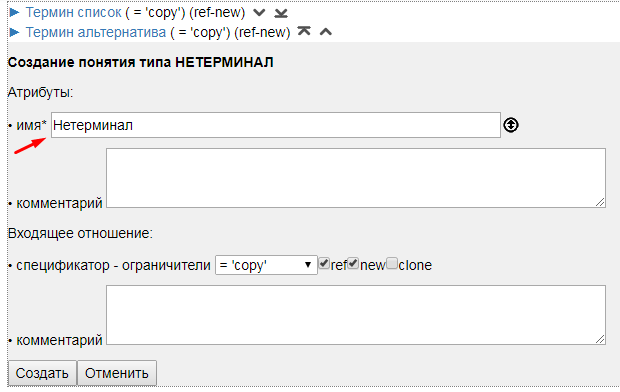
Once created, the new ontology term will appear in the list.
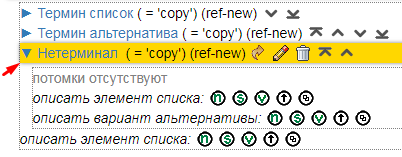
Generation of the concept of a knowledge base based on the concept of an ontology of the type "Nonterminal"
After creating the concept in ontology, the corresponding new concept will be available for generation in the knowledge base. In this example, a new concept of a knowledge base can be generated by creating a new term (by clicking on the name of the ontology term “Nonterminal”), creating a link to an existing term, or visiting cloning (the corresponding icons after the name of the ontology term Netterminal). In the example, the concept of a knowledge base is generated by creating a new term; other types of generation are described below.
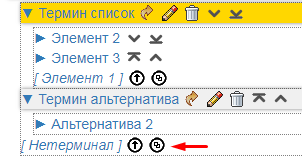
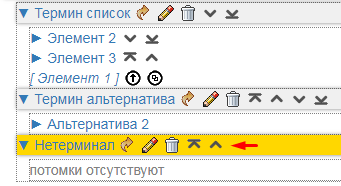
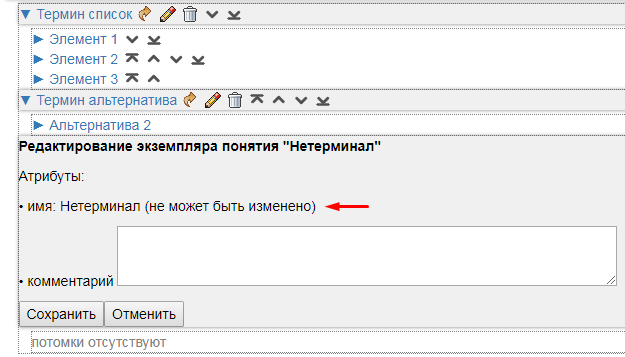
It is necessary to pay attention to the fact that the name of the generated nonterminal can not be changed, since in the ontology the type of the specifier was 'copy', which does not allow changing the name of the generated concept. The types of qualifiers are described below.
Terminal-grade
The concept, which in the knowledge base corresponds to the value of some type of data (number, text, etc.). A specific value is defined in the knowledge base, whereas in the ontology only the data type is defined. When creating a concept of this type, you must specify its unique name.
Creation of the term "Terminal-grade" in ontology

When creating a concept of this type, you must specify its unique name, the sort (the data type of the knowledge generated in the knowledge base), as well as the specifiers and delimiters of incoming relations (described below). If necessary, you can also specify comments for the term itself and incoming relationships.
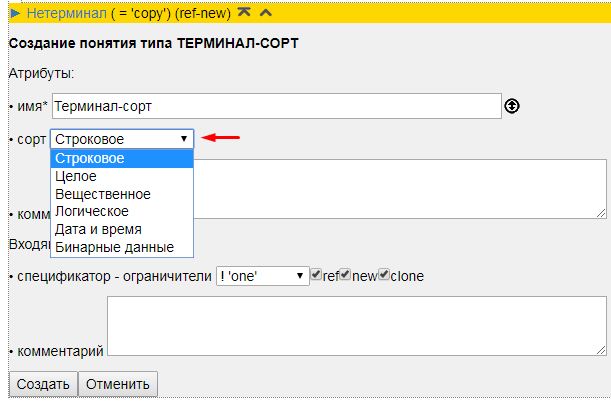
It is necessary to pay attention to the fact that for the concepts of "Terminal-grade" type unlike the concepts of "Nonterminal" type the specifiers of type "= copy" and "= copymm" are not available.
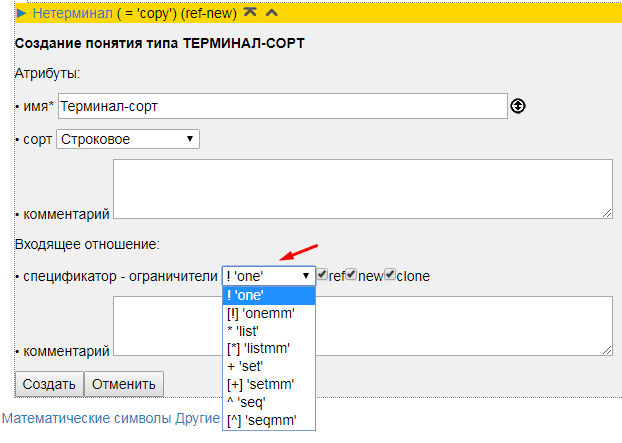
Once created, the new ontology term will appear in the list.

Generation of a knowledge base concept on the basis of an ontology concept of the type "Terminal-grade"
After creating a concept in an ontology, the corresponding new concept will be available for generation in the knowledge base. In this example, a new concept of the knowledge base can be generated by creating a new term (by clicking on the name of the ontology term - "Terminal-grade"), creating a link to an existing term or cloning the visitor (corresponding icons after the name of the term ontology - Terminal-grade). In the example, the concept of knowledge base is generated by creating a new term, other types of generation are described below.
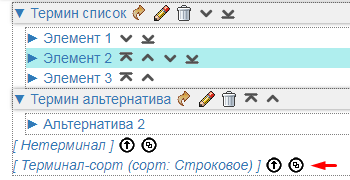
When generating the knowledge base term, you need to specify the value of the string type, since in the ontology the grade of the concept was specified as "String".
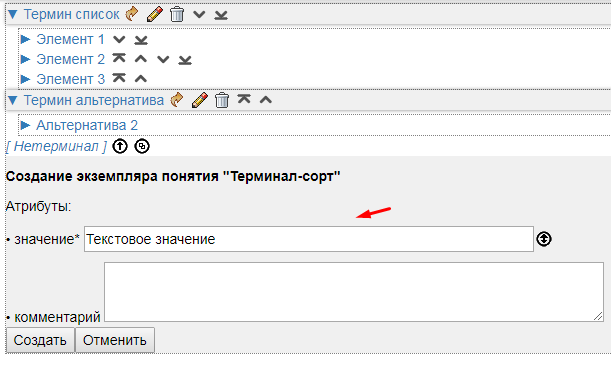
After creation, the new knowledge base term will appear in the list, and its value will be displayed.
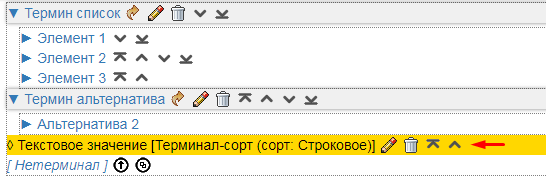
The value of the knowledge base term can be changed later.
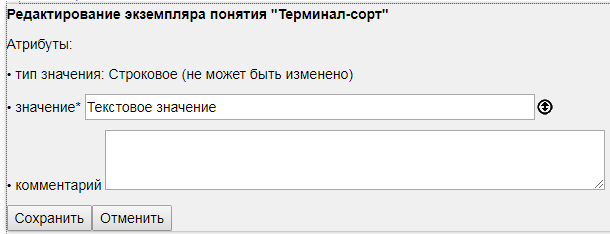
Терминал-значение
Понятие, которому в базе знаний соответствует значение некоторого типа данных (число, текст и т.д.). Конкретное значение определяется в онтологии и копируется к базу знаний.
Ссылка
Ссылка на другое понятие онтологии. Данный тип исходящих понятий описан в разделе 6.
Клон подсети
Копия другого понятия онтологии, включая его исходящие понятия. Данный тип исходящих понятий описан в разделе 6.
Terminal-value
The concept, which matches the value of some datatype (number, text, etc.) in the knowledge base. The concrete value is defined in the ontology and copied to the knowledge base.
Link
Reference to another concept of the ontology. This type of outgoing concepts is described in Section 6.
Subnet Clone
A copy of another concept of ontology, including its outgoing concepts. This type of outgoing concepts is described in Section 6.
